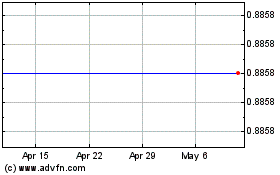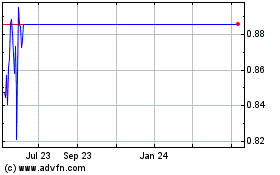The Financial Catastrophe Bond? -- WSJ
May 17 2016 - 3:03AM
Dow Jones News
Planned securities would insure against loss from rogue trader
or accounting errors
By Anupreeta Das and Leslie Scism
Can a company buy insurance against accounting errors?
Credit Suisse Group AG is going to give it a try in the bond
market. The bank plans as early as this week to launch unusual new
securities that would pay investors relatively high interest rates.
The catch is Credit Suisse could take their principal if incidents
like rogue trading, information-technology breakdowns or even
accounting errors lead to massive losses for the bank, people
familiar with the offering said.
The deal is a first-of-its-kind twist on the "catastrophe bonds"
that insurers have used for years to lay off the risk of natural
disasters like hurricanes. Credit Suisse's offering covers
self-inflicted disasters as well as external events and has been
marketed to hedge funds and other big investors.
The insurance feature of the bonds would be triggered if Credit
Suisse's annual operational risk-related losses cross $3.5 billion.
Buyers have a level of comfort, however, because it's a
"second-event" bond. The most any single event could contribute to
the trigger is $3 billion, meaning it would take more than one
event to cross the threshold. The odds of that are remote: Credit
Suisse has put them at roughly 1 in 500, the people said.
A Credit Suisse spokeswoman declined to comment.
The appetite for such offerings in the capital markets, as
persistently low interest rates send investors searching for higher
yields, is encouraging Wall Street companies to test new uses for
the structure.
Insurance-industry executives said that they haven't previously
seen a bank attempting to tap capital markets to cover this type of
risk. The move has its roots in regulation. Under European bank
rules, banks must calculate operational risk and may use insurance
products as part of meeting their capital requirements, according
to industry participants.
In general, operational risk is the possibility of losses
resulting from insufficient internal controls, errant systems or
rogue employees. The Credit Suisse offering doesn't cover market
losses from trading that is authorized by the bank, some of the
people familiar with the matter said.
Paul Schultz, chief executive of the Aon Securities unit of
global insurance brokerage Aon PLC, said an offering like Credit
Suisse's reflects "growing investor sophistication on the
underwriting side and a general view that to continue to grow the
asset class, investors are going to have to expand from simply
writing property risk."
Zurich-based Credit Suisse, via a Bermuda company called
Operational Re, plans to issue a five-year bond of up to 630
million Swiss francs ($646 million) to qualified institutional
buyers such as hedge funds, asset managers and firms that pool
together capital from pension funds. The bonds are part of a
planned package that includes an insurance policy of up to 700
million francs issued by Zurich Insurance Group. Most of the cost
of any claim would be paid for by the bonds. The size of the bond
offering and the policy limits ultimately will be determined by
investor interest, the people said. A spokeswoman for Zurich said
the company's policy is not to comment on current or potential
commercial relationships.
The coupon is expected to be in the "mid-single digits," one of
the people said -- higher than what Credit Suisse was initially
planning, in order to entice investors to buy the novel
security.
Credit Suisse last week reported a first-quarter net loss of 302
million francs, compared with a profit of 1.05 billion francs in
the same period last year. The bank's new chief executive, Tidjane
Thiam, has been retooling the bank away from its investment-banking
business toward its more stable wealth-management unit.
European banks have long used insurance products to meet capital
requirements set by regulators or to unload risk from their balance
sheets. Before the financial crisis, giant insurer American
International Group Inc. sold financial derivatives known as
credit-default swaps to major European banks as insurance against
losses in their holdings of subprime mortgage assets. AIG's near
collapse in 2008 in the wake of the housing-bubble burst was tied
to the massive volume of credit-default swaps it had sold.
As for Credit Suisse's new bond, the bank can't call on the
money to cover regulatory liabilities or government fines, the
people said. Losses from rogue trading, which have hobbled large
banks such as Société Générale and UBS Group AG in recent years,
could be covered by the insurance provided by the bond, but any
fines stemming from it wouldn't be, they said.
Write to Anupreeta Das at anupreeta.das@wsj.com and Leslie Scism
at leslie.scism@wsj.com
(END) Dow Jones Newswires
May 17, 2016 02:48 ET (06:48 GMT)
Copyright (c) 2016 Dow Jones & Company, Inc.
Credit Suisse (NYSE:CS)
Historical Stock Chart
From Mar 2024 to Apr 2024

Credit Suisse (NYSE:CS)
Historical Stock Chart
From Apr 2023 to Apr 2024
